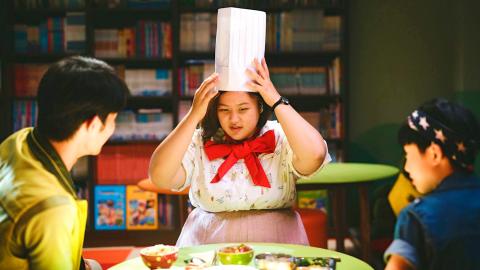From the trailer, Heavy Craving focuses on an obese woman who falls in love with a fit and handsome man and struggles to lose weight amidst constant ridicule about their relationship. If that’s all that this film was, it would have been a disappointing and missed opportunity to tackle a serious problem that unhealthily and unrealistically champions attractiveness.
Tsai Jia-yin (蔡嘉茵) delivers an impressive performance in her full-length debut as Yingjuan, who weighs over 100kg and whose only joy is cooking and eating. The nuances of her performance as someone who just wants to be herself but is constantly criticized and made fun of by even her mother (Samantha Ko, 柯淑勤) is deserving of a best new performer award at the Taipei Film Awards. She has been nominated in the same category for this weekend’s Golden Horse Awards.
Fortunately, the romanticisms are understated and constitute just a part of the film, and our relentlessly cheerful and caring pretty boy, Wu (Yao Chang, 張耀仁), harbors a dark secret, hitting home the point that people shouldn’t be judged solely by their appearance. Throw in cross-dressing boy Xiaoyu (Chang En-wei, 張恩瑋), whose mother believes that his behavior is a disease that needs to be cured, and the tale becomes a well-balanced and thoughtful social commentary on being oneself and fitting social expectations.

Photo courtesy of atmovies.com
However, at times it feels too much like just a social commentary, as there is little character depth outside of Yingjuan, with the supporting characters serving as different perspectives to emphasize the movie’s message. For example, Ko’s talents are wasted here. All she does is relentlessly criticize her daughter. Other people are already doing that, and Ko’s role as a harsh mother who believes that she is doing Yingjuan good could have been fleshed out a little more.
That said, the arguments are carefully considered and spelled out — from the mean-spirited neighbor who openly states that fat people are disgusting to the fitness center that represents society’s norms to Yingjuan, who along with Wu are the only people who encourage Xiaoyu not to repress himself.
In one scene, the fitness center coach (William Hsieh, 謝祖武) exclaims: “We all know that it’s what’s inside that matters, but in today’s fast paced society, people don’t have time to look at what’s inside. Would you buy a deformed fruit at the supermarket when there’s a perfect one next to it?” When a woman suggests that deformed fruit costs less, the coach asks: “Would you want someone to choose you because you’re cheaper?”

Photo courtesy of atmovies.com
That’s the unforgiving reality we live in today, and the coach does have a point. Even the encouraging Wu tells Yingjuan: “It’s too hard to change society. Why not change ourselves?” But to what extent should people who are different suppress themselves or change just to fit social expectations?
It’s a hard question that doesn’t have a simple answer. But it is something that really should be examined, especially in Taiwan where headlines comment on the attractiveness of a politician regardless of her accomplishments and agenda, and Internet users are bombarded with content featuring “hot” McDonalds staff and policewomen.
One may feel that the constant criticism and ridicule toward Yingjuan by almost everyone she meets — even by random boys playing in the park — is exaggerated. Surely people should have the common sense not to say hurtful things within earshot of the target? While the movie is definitely dramatizing for effect, it’s sadly true to a certain extent. Making fun of someone’s appearance is quite normalized — from insensitive nicknames to innocuous jokes to the unsolicited “hey, you’ve gained weight, don’t eat so much.”
Yingjuan’s pain and suffering is clearly and poignantly portrayed in the movie to the point of self deprecation. When Wu tells her she’s the first girl who’s been in his car, she laughs and says: “Oh, I count as one?”
But the most upsetting character is her mother, who is just as harsh, if not harsher, as the others. As the movie illustrates, such behavior does not help and only frustrates the person into eating more as it is the only thing that makes them immediately feel better.
This part also reflects reality. The Taiwan Millenium Health Foundation in August reported that 56 percent of survey respondents indicated that their family members have made fun of their weight, with remarks ranging from “fat pig” to “how pregnant are you?” Some reported getting sneered at by family members every time they eat a snack.
Director Hsieh Pei-ju (謝沛如), who has also struggled with weight issues, should be lauded for tackling this important topic. It’s encouraging to see more mainstream Taiwanese movies addressing social issues that are often overlooked. Despite the movie’s character deficiencies, Hsieh managed to put together an entertaining ride, and that’s often the only way to get people to pay attention to serious issues.

The low voter turnout for the referendum on Aug. 23 shows that many Taiwanese are apathetic about nuclear energy, but there are long-term energy stakes involved that the public needs to grasp Taiwan faces an energy trilemma: soaring AI-driven demand, pressure to cut carbon and reliance on fragile fuel imports. But the nuclear referendum on Aug. 23 showed how little this registered with voters, many of whom neither see the long game nor grasp the stakes. Volunteer referendum worker Vivian Chen (陳薇安) put it bluntly: “I’ve seen many people asking what they’re voting for when they arrive to vote. They cast their vote without even doing any research.” Imagine Taiwanese voters invited to a poker table. The bet looked simple — yes or no — yet most never showed. More than two-thirds of those

In the run-up to the referendum on re-opening Pingtung County’s Ma-anshan Nuclear Power Plant last month, the media inundated us with explainers. A favorite factoid of the international media, endlessly recycled, was that Taiwan has no energy reserves for a blockade, thus necessitating re-opening the nuclear plants. As presented by the Chinese-language CommonWealth Magazine, it runs: “According to the US Department of Commerce International Trade Administration, 97.73 percent of Taiwan’s energy is imported, and estimates are that Taiwan has only 11 days of reserves available in the event of a blockade.” This factoid is not an outright lie — that

Former Chinese Nationalist Party (KMT) chairwoman Hung Hsiu-chu’s (洪秀柱) attendance at the Chinese Communist Party’s (CPP) “Chinese People’s War of Resistance Against Japanese Aggression and the World Anti-Fascist War” parade in Beijing is infuriating, embarrassing and insulting to nearly everyone in Taiwan, and Taiwan’s friends and allies. She is also ripping off bandages and pouring salt into old wounds. In the process she managed to tie both the KMT and the Democratic Progressive Party (DPP) into uncomfortable knots. The KMT continues to honor their heroic fighters, who defended China against the invading Japanese Empire, which inflicted unimaginable horrors on the

Sitting on a bus bound for Heping Island (和平島), at the start of my first visit to Keelung in years, I was hell-bent on visiting a place of considerable historical interest, even though I knew that it wasn’t officially open to the public. In 2011, archaeologists working in the densely populated southern half of the island unearthed the foundations of the Convento de Todos los Santos (Convent of All Saints, 諸聖教堂), a Catholic house of worship established during Spain’s 1624-1642 occupation of northern Taiwan. I’d heard about its rediscovery a while ago, but it wasn’t until I read a scholarly